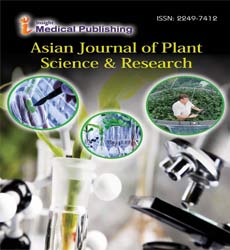ISSN : 2249 - 7412
Asian Journal of Plant Science & Research
Plant Pharmacology: Investigating the Bioactive Compounds in Medicinal Plants
Anne Chiou*
Department of Chemistry, Tsinghua University, Beijing, China
- *Corresponding Author:
- Anne Chiou
Department of Chemistry,
Tsinghua University, Beijing,
China,
E-mail: Chiou_A@Ned.Cn
Received date: June 01, 2023, Manuscript No. AJPSKY-23-17318; Editor assigned date: June 05, 2023, PreQC No. AJPSKY-23-17318 (PQ); Reviewed date: June 16, 2023, QC No. AJPSKY-23-17318; Revised date: June 23, 2023, Manuscript No. AJPSKY-23-17318 (R); Published date: June 30, 2023, DOI: 10.36648/2249-7412.13.6.095
Citation: Chiou A (2023) Plant Pharmacology: Investigating the Bioactive Compounds in Medicinal Plants. Asian J Plant Sci Res Vol.13 No.6: 095
Description
Plant-based medicine, also known as herbal medicine or phytotherapy, refers to the use of medicinal plants and their extracts for therapeutic purposes. It is a traditional healing practice that dates back thousands of years and is still widely practiced today. Plant-based medicine utilizes the active compounds present in plants to promote health, prevent illness, and treat various medical conditions. Plant-based medicine often draws upon traditional knowledge and practices passed down through generations. Indigenous cultures around the world have developed extensive knowledge about medicinal plants, their properties, and their applications for treating specific ailments.
Medicinal plants contain a wide variety of bioactive compounds, including alkaloids, flavonoids, terpenes, phenols, and many others. These compounds have specific physiological effects on the human body and can be extracted or prepared in different forms for medicinal use. Medicinal plants are often used in the form of herbal preparations, such as infusions (teas), decoctions, tinctures, poultices, and topical applications. These formulations are prepared by extracting the active compounds from plants using water, alcohol, oils, or other solvents. Plant-based medicine often takes a holistic approach to health and healing, considering the individual as a whole and addressing the underlying causes of illness rather than just treating symptoms. It emphasizes the body’s natural healing mechanisms and aims to restore balance and harmony.
Plant Pharmacology
Plant-based medicine is often used to support overall health and well-being. Many medicinal plants are known for their immune-enhancing, antioxidant, anti-inflammatory, and stress-relieving properties. They are also used preventively to promote good health and prevent illness. In recent years, there has been growing scientific interest in plant-based medicine. Research studies are conducted to identify the active compounds in medicinal plants, understand their mechanisms of action, and evaluate their safety and efficacy through preclinical and clinical trials.
Plant-based medicine is increasingly being integrated into mainstream healthcare systems as a complementary or alternative approach. It is often used in conjunction with conventional medical treatments to enhance therapeutic outcomes, manage side effects, and provide additional support for patients. The cultivation and sustainable harvesting of medicinal plants are important considerations in plant-based medicine. To ensure the long-term availability of medicinal plants, efforts are made to promote responsible harvesting practices, protect plant biodiversity, and support sustainable cultivation methods.
Plant-based medicine continues to be a valuable and respected form of healthcare worldwide. It offers a rich source of natural compounds with potential therapeutic benefits and provides an alternative or complementary approach to conventional medicine. However, it is important to consult with qualified practitioners and healthcare professionals when using plant-based remedies, as some plants may have interactions or contraindications with certain medications or medical conditions. Plant pharmacology is a branch of pharmacology that focuses on the study of plants and their bioactive compounds for therapeutic purposes. It involves the investigation of the pharmacological properties, mechanisms of action, safety, and efficacy of plant-derived compounds and extracts.
Plant pharmacology involves the identification and isolation of bioactive compounds from plants. This can include alkaloids, flavonoids, terpenoids, phenolics, and other secondary metabolites that possess pharmacological activities. Plant pharmacologists conduct screening assays and tests to determine the pharmacological properties of plant extracts or isolated compounds. This includes assessing their effects on cellular, biochemical, and physiological processes, as well as their potential therapeutic applications. Understanding the mechanisms of action of plant-derived compounds is a crucial aspect of plant pharmacology. Researchers investigate how these compounds interact with molecular targets in the body, such as receptors, enzymes, ion channels, or signaling pathways, to produce their pharmacological effects.
Plant pharmacology examines the pharmacokinetics (absorption, distribution, metabolism, and excretion) and pharmacodynamics (drug-receptor interactions, dose-response relationships) of plant-derived compounds to understand their behavior in the body and optimize their therapeutic use. Plant pharmacologists evaluate the safety and toxicity profiles of plant-derived compounds. This includes assessing their potential side effects, interactions with other drugs, and determining appropriate dosage levels to ensure their safe use.
Plant pharmacology involves preclinical studies, such as in vitro cell culture and animal models, to assess the efficacy and safety of plant-derived compounds. Promising compounds may progress to clinical trials, where their therapeutic potential is evaluated in human subjects. Plant pharmacology contributes to the development of plant-based drugs or natural product-inspired drugs. Researchers explore ways to optimize the formulation, delivery systems, and dosage forms of plant-derived compounds to enhance their bioavailability and therapeutic efficacy.
Plant pharmacology often incorporates traditional knowledge and ethnopharmacological studies, drawing on the wisdom of indigenous cultures and traditional healing practices that have utilized medicinal plants for centuries. Plant pharmacology also explores the interactions between plants and beneficial or pathogenic microorganisms. Understanding these interactions can lead to the discovery of novel compounds with therapeutic potential or the development of plant-based antimicrobial agents.
Toxicity Assessment
Plant pharmacology contributes to the development of new drugs, nutraceuticals, and therapeutic interventions. It provides valuable insights into the diverse chemical compounds present in plants and their potential for treating diseases, managing symptoms, and promoting health and well-being. The field combines aspects of botany, pharmacology, chemistry, and traditional medicine, bridging the gap between traditional herbal remedies and modern drug discovery.
Toxicity assessment is the evaluation of the adverse effects or potential harm caused by chemical substances, drugs, environmental agents, or other factors on living organisms, including humans. It involves studying the toxicological properties of substances to determine their safety levels and potential risks to human health and the environment.
Toxicity assessment can utilize various test systems and models, including in vitro cell cultures, animal models, and computational models. In vitro studies involve exposing cells or tissues to the substance of interest to observe its effects. Animal models, such as rodents or non-human primates, are used to study the effects of substances in whole organisms. Computational models use mathematical algorithms and simulations to predict toxicity based on chemical structure and properties.
Toxicity assessment examines the relationship between the dose or exposure level of a substance and the response or adverse effects observed. This relationship helps determine the threshold dose at which toxicity occurs and allows for the estimation of safe exposure levels. Toxicity assessments evaluate both acute and chronic toxicity. Acute toxicity refers to the immediate harmful effects resulting from a single exposure to a substance, while chronic toxicity refers to the long-term effects that develop over a prolonged period of exposure.

Open Access Journals
- Aquaculture & Veterinary Science
- Chemistry & Chemical Sciences
- Clinical Sciences
- Engineering
- General Science
- Genetics & Molecular Biology
- Health Care & Nursing
- Immunology & Microbiology
- Materials Science
- Mathematics & Physics
- Medical Sciences
- Neurology & Psychiatry
- Oncology & Cancer Science
- Pharmaceutical Sciences
